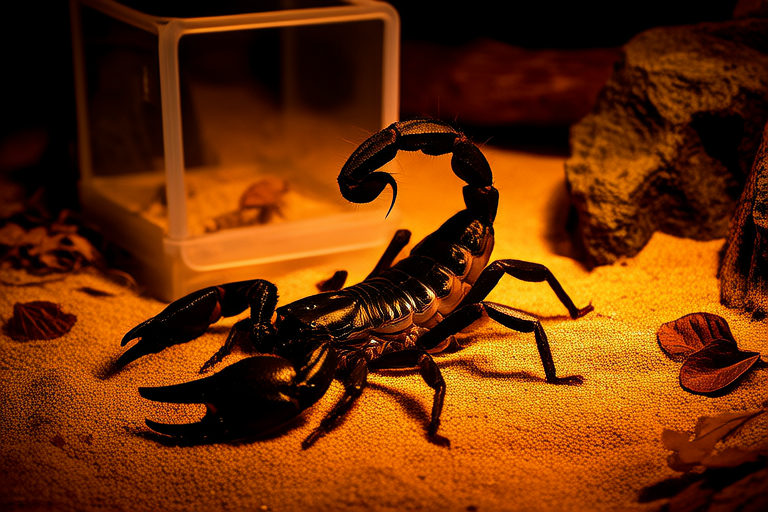From Jungle to Home: Caring for Your Very Own Heterometrus Spinifer Pet Scorpion
Welcome to the fascinating world of exotic pets! Among the many intriguing creatures you can bring into your home, the Heterometrus spinifer, also known as the Asian forest scorpion, stands out as a unique and captivating choice. This guide will walk you through the essential aspects of caring for this remarkable arachnid, ensuring both its well-being and your enjoyment as its owner.
Habitat Setup
Creating the right environment for your Heterometrus spinifer is crucial for its health and happiness. These scorpions are native to tropical regions, so their enclosure should mimic their natural habitat.
- Enclosure Size: A minimum of 10 gallons for one adult scorpion is recommended. Larger enclosures are better for multiple scorpions.
- Substrate: Use a substrate like coconut fiber or peat moss to maintain humidity levels between 70% and 80%. Avoid using wood chips or bark, as these can cause respiratory issues.
- Humidity: Regular misting helps keep the substrate moist but not soggy. Use a hygrometer to monitor humidity levels.
- Temperature: Maintain a temperature gradient within the enclosure, with a warm side around 90°F (32°C) and a cooler side around 75°F (24°C). Use a heat mat or under-tank heater.
- Hiding Spots: Provide plenty of hiding spots such as cork bark, half logs, or artificial plants. Scorpions need places to hide and feel secure.
Dietary Needs
The dietary requirements of the Heterometrus spinifer are straightforward yet critical for its health. They are carnivorous and require a diet rich in protein.
- Feeding Frequency: Feed adult scorpions once every 1-2 weeks. Juveniles may need more frequent feedings, approximately every 5-7 days.
- Prey Items: Offer appropriately sized insects such as crickets, mealworms, and dubia roaches. Ensure prey items are no larger than the width of the scorpion’s body.
- Variety: Introduce variety in their diet by occasionally offering waxworms, silkworms, or superworms. This provides different nutrients and keeps feeding interesting.
- Supplements: Dust feeder insects with calcium and vitamin D3 supplements to prevent metabolic bone disease.
Handling and Safety Tips
While Heterometrus spinifer can be kept as pets, they are not typically handled due to their venomous nature. However, if you choose to handle them, follow these guidelines:
- Gloves: Always wear thick gloves when handling your scorpion to protect yourself from their venom.
- Environment: Handle your scorpion in a well-lit area to avoid accidental bites. Scorpions tend to sting in response to perceived threats.
- Frequency: Minimize handling to reduce stress on the animal. Handling should be limited to necessary tasks such as cleaning the enclosure.
Health Concerns
Despite being relatively hardy, Heterometrus spinifer can face certain health issues if not cared for properly.
- Metabolic Bone Disease (MBD): Caused by calcium deficiency, MBD can lead to weak exoskeletons and difficulty molting. Ensure proper supplementation of calcium and vitamin D3.
- Respiratory Issues: Improper substrate or overly moist conditions can cause respiratory problems. Monitor humidity levels carefully.
- Stress: Stress can weaken the immune system and lead to various health issues. Providing a stable environment with adequate hiding spots helps reduce stress.
Legal Considerations
Before bringing a Heterometrus spinifer into your home, check local laws and regulations regarding exotic pets. Some areas may have restrictions or require permits for owning certain species.
- Permits: In some regions, owning a Heterometrus spinifer may require a special permit. Research and comply with all local and national regulations.
- Trade Restrictions: Be aware of international trade laws, especially if you plan to import your scorpion from another country.
- Ethical Considerations: Consider the ethical implications of keeping exotic animals as pets. Ensure you are committed to providing a lifelong home for your scorpion.
Unique Characteristics of Heterometrus Spinifer
The Heterometrus spinifer has several unique traits that make it both an interesting and challenging pet.
- Size: Adults can reach lengths of up to 6 inches (15 cm), making them one of the largest scorpion species commonly kept as pets.
- Venom: Their venom is potent enough to cause pain and swelling in humans but is generally not life-threatening. However, allergic reactions can occur, so always seek medical attention if stung.
- Behavior: These scorpions are generally docile and nocturnal, spending most of their time hiding during the day.
Caring for a Heterometrus spinifer requires dedication and knowledge. By understanding their specific needs and providing a suitable environment, you can ensure a long and healthy life for your scorpion. Whether you’re a seasoned reptile keeper or new to the hobby, the Heterometrus spinifer offers a unique and rewarding experience.
